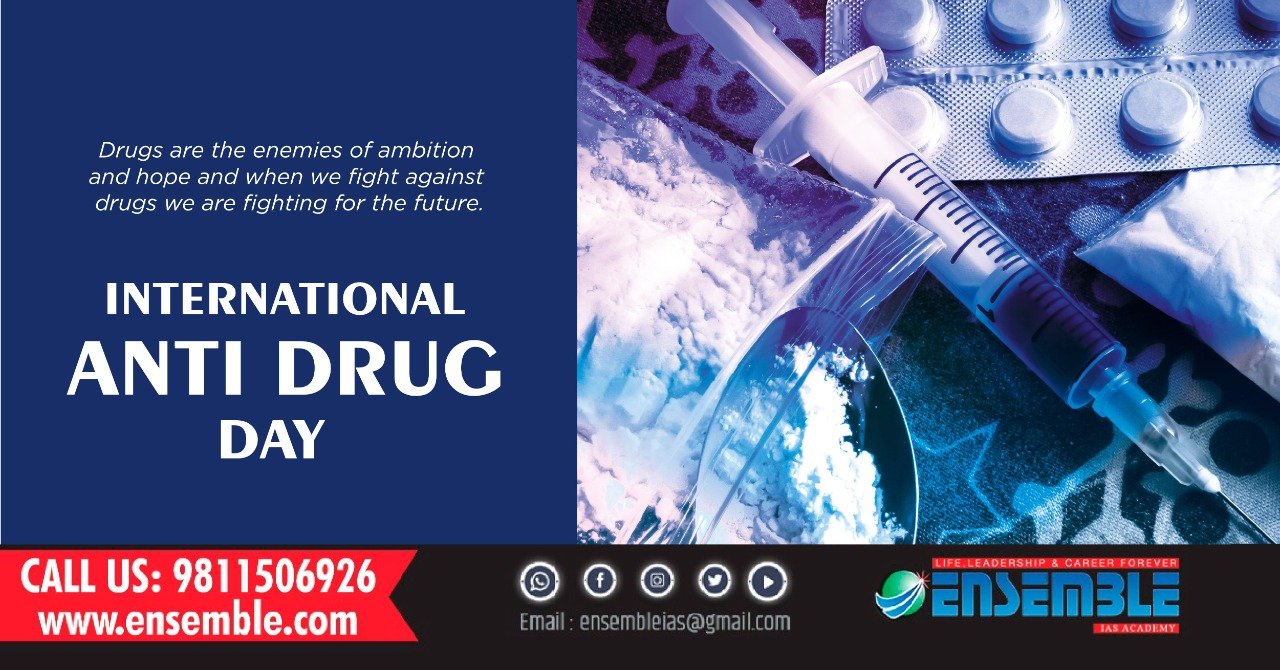International Anti Drug Day
International Day Against Drug Abuse and Illicit Trafficking
COVID-19 has brought unprecedented public awareness on health, protective measures for staying healthy, and most importantly, and on protecting each other. A growing sense of global community and solidarity continues to emerge, as does the need to ensure health care for all. Now everybody realises that health is the real wealth. It’s the healthy body that let everybody be in comfort and happy.
But long before efforts were taken to save the health of the people, International Day Against Drug Abuse and Illicit Trafficking was started aiming at combating misinformation and generating awareness and promoting the facts on drugs — from health risks and solutions to tackle the world drug problem, to evidence-based prevention, treatment, and care.
To buy our online courses: Click Here
Commonly people thought that drug abuse only include consumption of drugs such as cocaine, hallucinogens, cannabis, opiates among others, but it was brought to light that drug abuse also includes prescription medications such as painkillers and sleeping pills.
History
Originally instigated by a resolution of a special session on drugs of the UN’s General Assembly in 1987, the annual awareness day was founded to mark the centenary of China’s early efforts to combat the trade in opium – widely regarded as the start of the international war on drugs.
By resolution 42/112 of 7 December 1987, the General Assembly decided to observe 26 June as the International Day against Drug Abuse and Illicit Trafficking as an expression of its determination to strengthen action and cooperation to achieve the goal of an international society free of drug abuse. The day is also meant to commemorate Lin Zexu’s efforts towards the strategic dismantling of the opium trade in Humen, Guangdong in China right before the First Opium War on the Chinese Mainland.
Theme of International Day against Drug Abuse and Illicit Trafficking 2021
Celebrated each year on June 26th, this year in 2021 the theme is “Share Facts On Drugs, Save Lives”.
Main actions taken by the UN Office on Drugs and Crime are:
- To highlight the dangers of drug use and their illegal trade
- Provides educational material to teachers and public officials all over the world
- To help spread the message about the extreme cultural and economic harm the trade in drugs is still doing across the globe.
This was supported each year by individuals, communities, and various organizations all over the world, this global observance aims to raise awareness of the major problem that illicit drugs represent to society. Also there were a demand from the decision-makers to support life-saving services for drug users so that they can respond to the crisis in a flexible and informed way.
Significance
Effective responses to the world drug problem require inclusive and accountable institutions of criminal justice, health and social services to work hand in hand to provide integrated solutions, in line with the international drug control conventions, human rights obligations and the Sustainable Development Goals.
Drug abuse is one of the most serious health problems. Besides causing serious diseases such as HIV, hepatitis, and tuberculosis, it has several side effects. These include economic loss, antisocial behaviour such as stealing, violence and crime, social stigma and overall downfall of the society.
Drug rackets operate internationally, but some countries are trans-shipment points for drug circulation. India, possibly because of its strategic location, is more prone to drug activities including drug trafficking and local consumption. The influence of westernization, changing family structure and peer pressure are some of the reasons behind drug abuse.
Therefore it is a concerted and cooperative effort which will, if not stop, atleast reduce to a large extent.
India’s steps to combat the drug abuse and related issues
- Ministry of Health and Family Welfare (MoHFW) and Ministry of Social Justice and Empowerment (MSJE), Government of India are involved in alcohol and drug demand reduction policies and drug de-addiction programme (DDAP) in the country.
- Various e- Health web based programmes related to prevention of substance abuse such as alcohol e-Help (alcoholwebindia.in/intervention) operated by National Drug Dependence Treatment Centre (NDDTC),AIIMS, Delhi and m-Cessation programme (nhp.gov.in/quit-tobacco) for tobacco cessation have been initiated by Ministry of Health and Family Welfare, Government of India.
- National AIDS Control Programme (NACP): Ministry of Health and Family Welfare, Government of India, has implemented various targeted interventions programme for IDUs such as Needle and syringe programme, and Opioid substitution therapy.
- The MSJE has formulated a central sector scheme of assistance for prevention of alcoholism and substance (drugs) abuse for social defence services, which has been updated in 2015.
Also Read: China to Run First Electric Train in Tibet
- The Department of Revenue, Central Government acts as an administrator of the Narcotic Drugs and Psychotropic Substances (NDPS) Act, 1985 and the Prevention of Illicit Traffic in Narcotic Drugs and Psychotropic Substances Act, 1988;
- The Narcotics Control Bureau, Ministry of Home Affairs functions as an enforcement agency for the NDPS Act.
